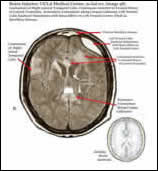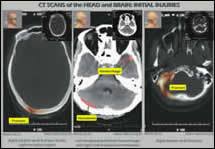Orange County Brain Injury Attorney
A victim of a traumatic brain injury is not only presented with a tremendous physical challenge but a psychological one as well. As such, it is important that brain injury victims seek legal representation and consult with a lawyer that has experience with brain injuries in particular. The Orange County brain injury lawyers at Aitken * Aitken * Cohn have assisted countless brain injury clients to reach extremely successful results in their legal matters.
Traumatic brain injury is sudden physical damage to the brain and is commonly known as the “The Silent Epidemic” as the brain’s injuries are unseen. The head forcefully hitting an object may cause the damage or by something passing through the skull and piercing the brain, like a gunshot wound or other penetrating head injury. The most common cause of traumatic brain injury is motor vehicle accidents. Other causes include falls, sports injuries, violent crimes, and birth injury.
Common causes of brain injuries
Brain injuries can happen in a variety of ways. Typically, they are caused by a blow to the head or some other traumatic injury to the head or to the body. The severity of brain injury depends on several factors, including the force of the initial impact and the nature of the injury itself. Some of the most common events that cause a traumatic brain injury include:
- Falls. This can include falls from a bed, ladder, down the stairs, in the bathroom, slip and falls in stores, and more. Falls are the most common cause a brain injury overall, particularly for older adults and children.
- Vehicle accidents. Traffic accidents or another leading cause of traumatic brain injury. This can include vehicle versus vehicle accidents as well as incidents involving motorcycles, bicycles, in pedestrians.
- Sports injuries. Traumatic brain injuries are regularly caused by sports and recreation activities. Many sports such as football, basketball, boxing, skateboarding, hockey, and other high-impact sports can lead to serious head injuries. Sports-related brain injuries are particularly common among younger adults and children.
- Explosive incidents. Blasts from explosions are a common cause of traumatic brain injury in military personnel.
- Violence. Incidents such as child abuse, domestic violence, other assaults, and gunshot wounds will likely cause traumatic brain injuries. Shaken baby syndrome is a leading cause of traumatic brain injury for infants and is caused by adults violently shaking an infant.
Types of brain injuries
There main types of injuries that can affect the brain include:
- Hemorrhage. This indicates an uncontrolled bleeding and can occur in the space around the brain. This could also include bleeding within the brain tissue itself.
- Hematoma. This refers to the clotting of blood outside the brain vessels or within the brain. The clotting can build-up pressure inside the skull.
- Concussion. A concussion is a mild traumatic brain injury and occurs when an impact is severe enough to jostle the brain back and forth in the skull.
- Edema. This refers to swelling of the brain. This can be incredibly dangerous because the skull cannot stretch to accommodate any swelling, which can lead to dangerous pressure build-up inside school.
- Skull fracture. The skull is very difficult to break, so a skull fracture indicates that there was a significant blow to the head that could affect the brain.
Effects of Brain Injury
Physical, behavioral or mental changes are dependent upon which areas of the brain are injured. Most often focal brain damage occurs, which is damage confined to just a small area of the brain. This point is usually where the head has hit an object. “Closed head” brain injuries oftentimes causes scattered brain injuries or damage to other areas of the brain. Diffuse damage is the result of an impact causing the brain to move back and forth against the skull. Frontal and temporal lobes, responsible for speech and language, are often the most affected because they sit in the areas of the skull that allows more room for the brain to shift and sustain an injury. Speech and language are therefore affected, as well as voice, swallowing, walking, balancing, and coordination difficulties and changes in the ability to smell and in memory and cognitive skills.
The effects of brain damage are generally greatest immediately following the injury. However, long-term problems are difficult to assess because some damage may be caused by contusion, bruising of the brain that is usually temporary. Focal damage may result in long-term and permanent difficulties. Other areas of the brain can learn to take over the functions of the damaged areas over time and can improve the condition. When a traumatic brain injury occurs in a child they may progress better than an adult because their brain has a greater capability to be flexible.
The brain stem regulates basic arousal and regulatory functions, as well as being involved in attention and short-term memory. When a traumatic brain injury occurs and affects this area, disorientation, frustration and anger can result. In moderate to severe injuries, swelling can cause pressure on the brainstem. Consciousness or wakefulness can be affected so a person may fall into a coma.
Higher up in the brain than the brain stem, is the limbic system, which helps regulate emotions. The temporal lobes are connected to the limbic system and are involved in many different cognitive skills, including memory and language. Behavioral disorders have resulted from damage to the temporal lobes, or seizures in this area. Almost always, the frontal lobe is injured in traumatic brain injuries because it is so large in size and is located near the front of the cranium. The frontal lobe is considered the emotional and personality control center, as well as many cognitive functions. Damage to the frontal lobe can lead to decreased judgment and increased impulsivity.
Traumatic brain injury can cause cognitive impairments, like trouble concentrating, trouble organizing thoughts and becoming easily confused or forgetful. Learning new information may be difficult and interpreting the actions of others will lead to social problems, like making inappropriate statements. Problem-solving, decision-making and planning could be difficult as well as judgment.
“Chris and his staff are always willing to help. The communication throughout the process is very much appreciated!!”
A.H. – Google Review
Language issues like articulating words and forming sentences may become difficult after brain injury. Frustration and anger can be directed at the other person because of the difficulties a person with a brain injury can experience when trying to carry on a conversation. Others may not even be aware of their errors. Reading and writing become a problem also. Mathematical abilities, simple or complex, are also often affected.
A traumatic brain injury can cause conditions, such as dysarthria, which starts to slow, slur, and make speech difficult to understand if the speech mechanism muscles become damaged. Swallowing can become problematic brought on by dysphagia, and a condition called apraxia can make repeating words in a consistent manner difficult.
Long-term effects of brain injuries
For moderate to severe traumatic brain injuries, victims could have life-long disabilities or motor deficits. There are a range of deficits that a person may experience, and no two brain injuries are the same. Some examples of long-term motor effects of a brain injury that a person may experience could include:
- Paralysis
- Muscle stiffness or uncontrolled movements
- Difficulty carrying or moving objects
- Vision problems
- Loss of fine motor skills
- Problems walking, talking, or swallowing
- Inability to recognize objects
- Difficulty thinking and memory problems
Other relationship and societal difficulties that a brain injury victim may face include:
- Difficulty making and keeping relationships (both personal and professional)
- Difficulty taking part in social activities
- Difficulty with recreational or leisure activities
- An inability or decreased ability to keep a job or attend school
- Degenerative brain disease
Treatment for Traumatic Brain Injury
It is best to begin treatment early when cognitive and communication problems arise from a brain injury. If a hospital visit resulted from the injury, treatment usually begins there. A therapist will work with the individual to help them focus on improving their orientation to the surrounding situation and to stimulate speech and understanding. Oral motor exercises are used when there are speech and swallowing problems. Long-term rehab can be assessed by the individual’s injuries and needs. There is rehabilitation specific to people with traumatic brain injury, including speech-language pathologists, physical therapists, occupational therapists, and neuropsychologists.
Rehab will help a traumatic brain injury victim reach the highest level of independent functioning that they can, depending on the seriousness of the accident. Therapy works on restoring lost skills. Some people lose abilities after a traumatic brain injury and will have to learn to compensate for them. The most difficult part of traumatic brain injury is receiving the proper treatment. If a head injury does not result in hospitalization and the injury is a closed head injury, failure to diagnose a problem during an office visit may result.
Ways to prevent brain injuries
There are various ways to prevent brain injuries. While not all brain injuries are predictable, some of the best ways you can protect yourself include:
- Buckling up for every car ride
- Never drive while impaired by alcohol drugs
- Wear a helmet when you or your children or doing any of the following
- Riding a bike, motorcycle, ATV, scooter, etc.
- Playing a contact sport such as football, hockey, or boxing
- Using a skateboard or roller skates
- Riding a horse
- Skiing or snowboarding
- Preventing older adult falls implementing appropriate safety measures
- Making living and play areas safe children
Contact an Orange County Brain Injury Attorney
Aitken * Aitken * Cohn has successfully represented numerous victims of traumatic brain injury in Orange County, California, and Nationwide. The law firm has the compassion, resources, and experience to consult the unfortunate victims of brain injury. For a free consultation from a nationally recognized Orange County personal injury lawyer, please contact 1-866-434-1424 or fill out the contact form and a specialist will be in touch shortly.



